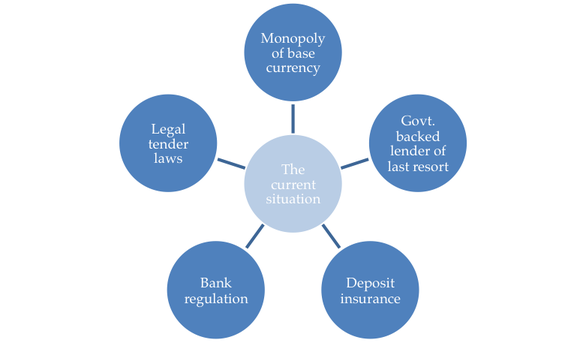In his latest article for ConservativeHome, Steve Baker considers the viability of America’s central bank:
A review of the US Federal Reserve’s own document: “FEDERAL RESERVE statistical release, H.4.1: Factors Affecting Reserve Balances of Depository Institutions and Condition Statement of Federal Reserve Banks”, issued on August 23rd 2011, reveals some interesting information about the state of the Federal Reserve, the US central bank: it’s very nearly bust. As it is indirectly the lynchpin of the global financial system, that matters to the UK.
The size of the Fed’s balance sheet is now about $2,843 billion, up from about $800 billion three years ago. The huge increase in the Fed’s balance sheet stems from bailouts, quantitative easing, and other central bank “liquidity” operations.
…
The Fed’s capital base is $71 billion. That represents about 2.5% of its assets, or a leverage ratio of 40 times its capital. This ratio would have been considered unthinkable prior to the crisis: it is about four times greater than that permitted by the new Basel proposed rules for commercial banks and simply demonstrates that the bailout format and quantitative easing do not make these problems go away. If the patient has been incorrectly diagnosed, taking the wrong medicine will not cure him.This capital to asset ratio means that a loss on its assets of 2.5% would be enough to make the Fed, by any normal standard, insolvent – unable to pay its debts.
Read the entire article to find out just how likely this is.





If the currency in the realm is paper which can be increased as required how does a central bank go bust as it were?
A loss as mentioned above would naturally constitute a winding down of a business, however are central banks not in charge of the return they make? Is this not correct?
I am failing to grasp the concept of a central bank going bust.
Maybe I am being naive.
Any help would be appreciated.
Thanks.
Officially central banks operate rather like commercial banks. They have assets, which are normally government bonds, and liabilities, which are notes and reserves. To the central bank “reserves” are liabilities, they’re what current account balances are to commercial banks.
AFAIK Steve Baker is quite right about the Fed. I think it’s likely that if it does get close to bankruptcy then it will be bailed out by the US treasury. The same goes for the ECB.
I’m not sure if he’s right about inflation though.
Commercial banks and central banks are chalk and cheese: comparing the two is fraught with pitfalls.
I don’t see any sense in which a central bank can go bust. Amongst other reasons this is because one of the main so called liabilities of a central bank is physical cash in circulation (about half the BoE’s liabilities), and this so called liability is not really a liability.
As Willem Buiter put it, “These monetary (base money) ‘liabilities’ of the central bank are not in any meaningful sense liabilities, because they are irredeemable…” See:
http://blogs.ft.com/maverecon/2008/03/wanted-tough-love-from-the-central-bank/
In other words while it is true that there is a little inscription of £20 notes which says “I promise to pay the bearer….”, just try going along to the BoE and getting a lump of gold in exchange for your £20 note: you’ll be told to shove off.
A central bank could be in the position where it owed significant amounts of money but felt it could not dish out the money because of inflationary consequences. But in this case it could raise interest rates, or tell the finance minister to raise taxes, unless the finance minister wants to see inflation go through the roof.
That’s right.
The problem here is firstly that even though the central bank’s reserves aren’t really redeemable the central bank may still be legally bankrupt if the value of its assets falls below that of it’s reserves. Of course the state may well sanction that state of “bankruptcy”.
It doesn’t really matter since the central bank will get bailed out in some way anyway.
How can the central bank be bailed out? It has the sole power in issuing the currency of the nation. It does not make sense that it would require bailing out.
Also the value of its assets…It can purchase any item in the economy through its printing presses. The value of its assets is only a book keeping entry.
I am thinking from the view point of a central bank…if I was in charge of one, the balance sheet in my mind would be non existent from the point of view of how businesses/accountants would view it. I have the sole power to issue currency…I am untouchable to the point I am not reckless…
This is what I have learn so far reading Austrian Economics.
It makes no sense to me yet legally even that a central bank can go bust.
As the discussion between Ralph and I shows it’s not entirely clear.
Officially speaking the central bank has accounts. It’s assets are government bonds, it’s liabilities are reserves and notes. As Ralph points out these aren’t “liabilities” in the normal sense because they can’t be redeemed, but they remain liabilities as far as accounting is concerned. That means if the central bank’s assets become worth less than it’s liabilities then it is bankrupt. In the case of the Fed things are a bit different, during the crisis it took on the power to buy other types of assets than government bonds, it started buying commercial loans. It risks going bankrupt from those activities as Steve Baker points out.
If it were to come close the US government would bail it out by giving it bonds for free, or some similar arrangement.
Well, even Gosbank in USSR couldn’t fail and also small negative equity doesn’t threaten the going concern of a Central Bank. But THIS IS NOT THE SIGNIFICANT POINT. It doesn’t matter if from a legal standpoint the bank can operate when you are ruling an almost broken and depreciated currency. Moreover, expanding the balance sheet matters: bondholders own a claim over future production, incomes, wages and profits that have to be paid collecting taxes or debasing currency. And (without mentioning the other effects on capital structure) they BOTH reduce profit expectations in REAL terms: they literally “eat” profit, and in a free market economy investors engage business activities and compete for profit.
Last, but not least, people can fly away from a fiat money (into another one perceived as more stable or into real goods in case of hyperinflation) and as long as measures of financial repression aren’t enforced and the economy is open, it doesn’t matter if you have to pay taxes in local currency: corporations and wealthy people simply can minimize their REAL cash balances in national money using something else as a store of value. This could seem not so much important for US, considered the role that USD plays in global economy, but for other countries like Russia, Poland, Brazil, UK, etc. it matters a lot.